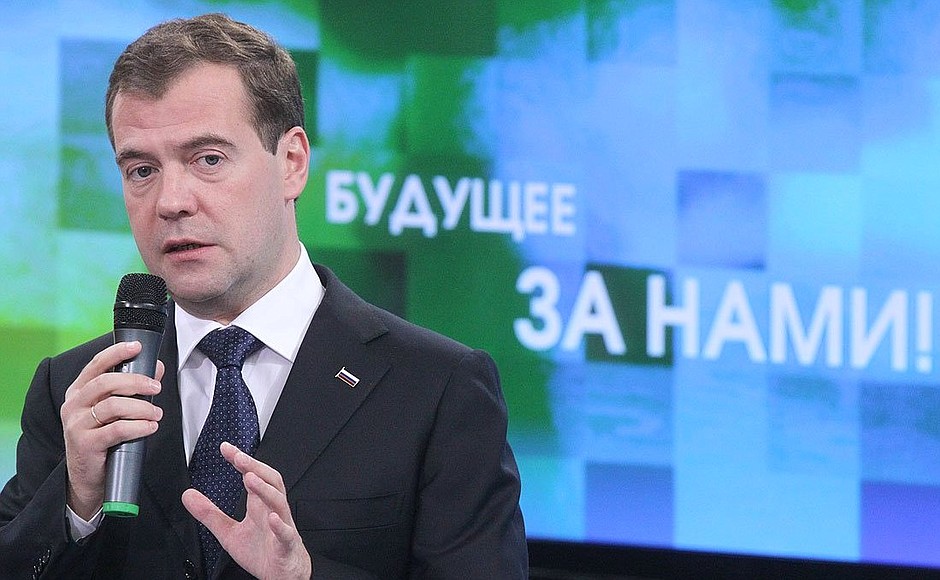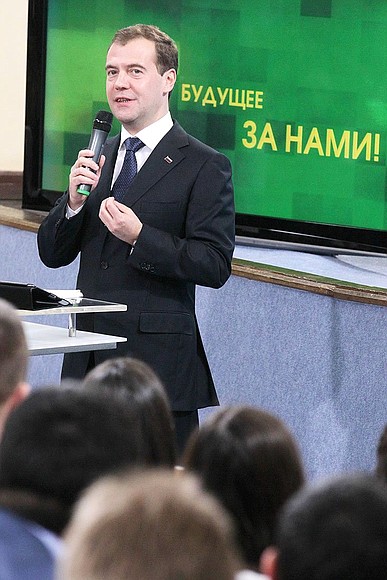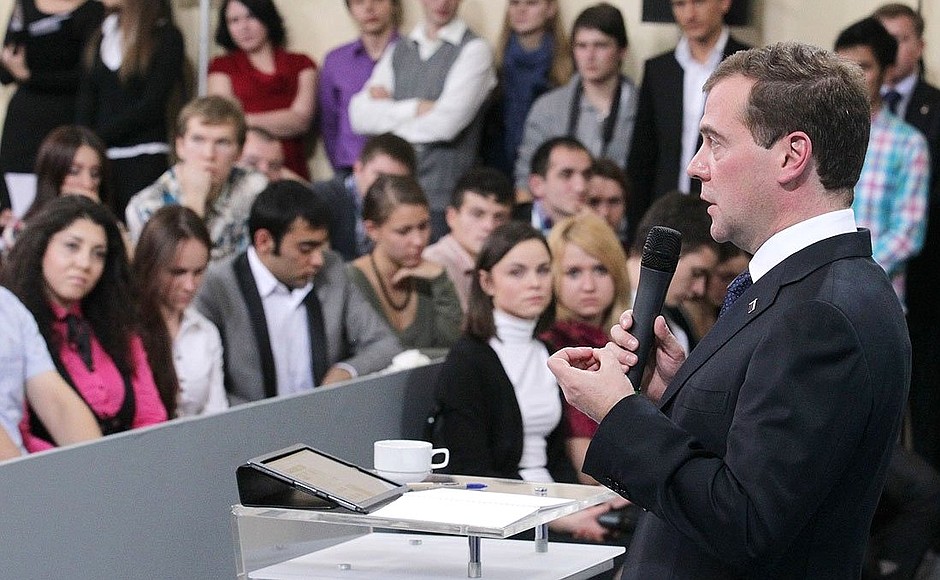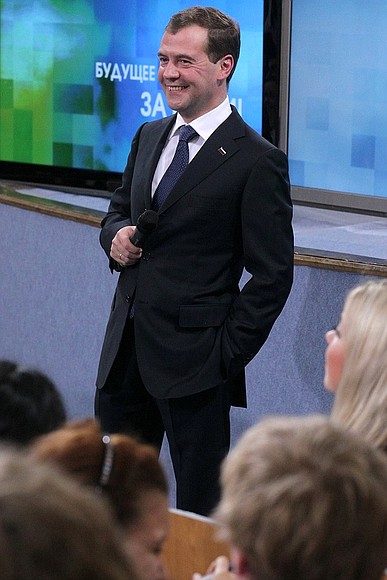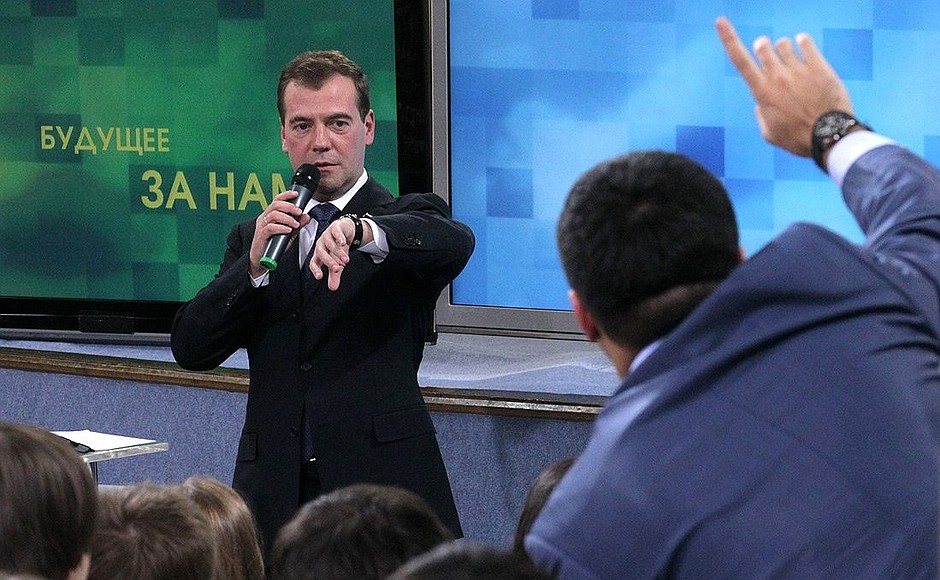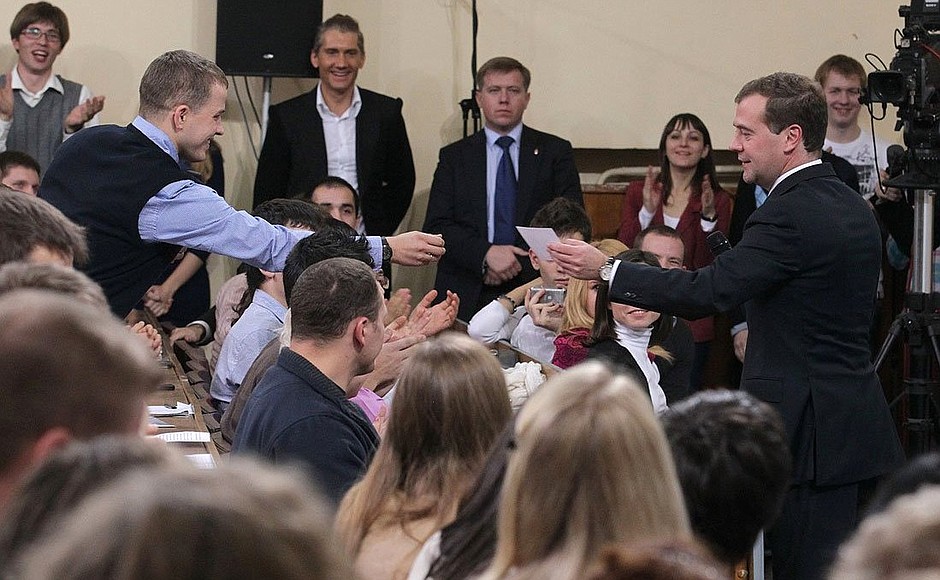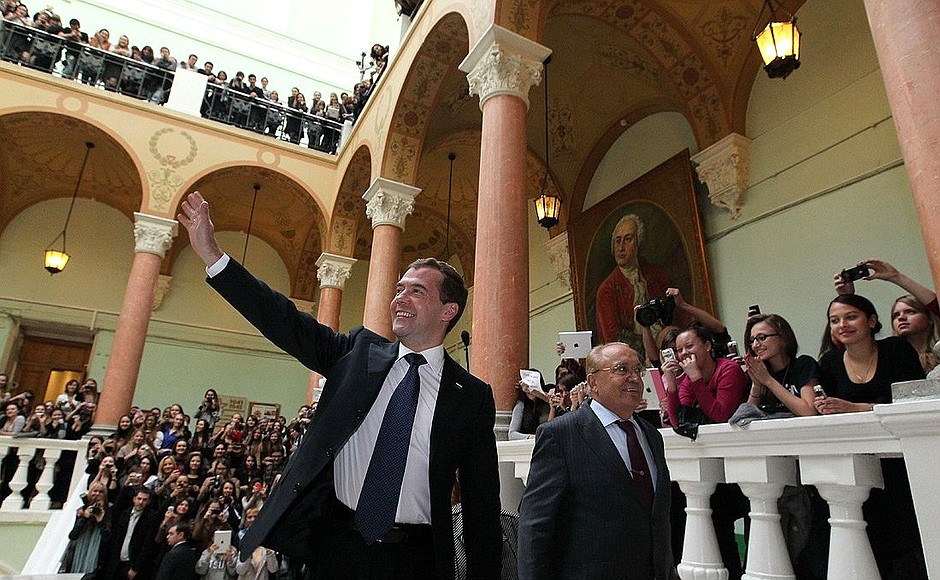Interethnic relations were one of the key topics discussed at the meeting.
* * *
President of Russia Dmitry Medvedev: This is my first time in this building. Some of you are guests from different places, including outside of Moscow, but this place has a powerful energy, I can feel it right away.
I have been meeting and talking with people a lot recently, so if I may, this is what I’d like to do today: I will make just a few opening remarks for three to five minutes, and then we will begin our discussion. This way, it will be more interesting for you, and it will be simpler for me. I only want to warn you that I must leave in exactly one hour. So I have a request: please make your questions brief, and I will try to answer them briefly too.
I propose that we make interethnic relations, a very important issue, one of the main subjects of our discussion. This is a matter that’s always had great significance for our country, but I must admit that in the last several years it has become especially pertinent. Why? Because our nation has always been multi-ethnic and has had its particular problems. In the USSR all these problems were declared hardly existent and, let’s be honest, their manifestations were sometimes severely repressed. Today, the country is diverse, which is good, because all of us are different; all of us are asking one another various questions, and this is at times a cause of complications, since there are one hundred and eighty ethnic groups living within Russia. Of course, their historical cooperation experience is unique. There is no other nation or federation like ours in the world
Sometimes, certain of my foreign colleagues start telling me what I ought to be doing; they sometimes demonstrate teaching talents and tell me how we should best improve interethnic relations, democracy, and our political system. But when they do this, they forget about a factor that is absent in many, if not most, nations: all their federations usually have just one ethnicity and are very rarely based on a multinational or quasi-national principle. Whereas we have a different situation, and moreover, when our federative state was designed, back in the Soviet period, frankly, there was no federation. And Joseph Stalin, who as we know at one point headed the Ministry of Nationalities, did not want to build any kind of a federative state. Still, a superficial form of federative state was declared since the 1920s.
But nowadays we have a real federation which is somewhat a cause for certain development problems. We have seen many other problems emerge since our life has become open. None of you may remember the practice which existed when I was of your age, I mean residence permit. It was impossible to register and reside in any location apart from your own, unless corruption schemes were employed. Now, you can travel wherever you want and register for residence in any place. And many people have begun to migrate from one part of the country to another. We also have many migrants from Asian nations, in addition to domestic migration. Unfortunately, not everyone who comes here is willing to immediately integrate in a particular region, to take on its customs and practices. Sadly, there are cases when large migrations result in the emergence and development of ethnic criminal groups. This is also something we cannot ignore.
It is no secret that this can evoke a response among the local residents. In some cases, it may be justified, and in other cases, it isn’t. It may be lawful or entirely unlawful. Unfortunately, all of this often turns into a witch-hunt on the new-comers; occasionally, some of them are even killed. Usually, the people who suffer are not criminals or heads of ethnic criminal groups – no, those people maintain their interests, remain hidden, and are fine. Instead, it is the most defenceless individuals who suffer. Regrettably, another process is also underway: the continued outflow of ethnic Russians from many regions. All of this leads to interethnic aggravation and tension. The statistics on this matter are fairly well-known: I can tell you that in the first nine months of this year, foreign citizens committed 34,500 crimes, while the number of crimes committed against foreign citizens amounted to some 10,000. The Interior Ministry is aware of 55 different ethnic criminal groups, and seven of those are extremist groups.
How do we deal with these challenges? I think there can only be one answer: our state must be strong and must remain united. I can tell you that it was quite painful for me when the Soviet Union fell apart. And not because I was an advocate for socialist values; on the contrary. But when you feel your Fatherland is disappearing, crumbling into pieces, it is a very heavy sensation. So all those criminals, extremists, and separatists should not be categorised on an ethnic basis; instead, they must be punished and not consider themselves protected by the law or shielded by any kind of groups.
Finally, in conclusion, we need a reasonable ethnic policy – that is the most difficult part. Because it is easier to talk about it, to write various concepts – some helpful, others entirely useless – but it is much more difficult to apply this policy in practice. We should offer an adequate education everywhere, in every part of our nation. We also are to advocate the idea that our cultural experience, the experience of coexistence between different ethnicities, is a great heritage, and we can only be powerful in this globalised world if we stand together. This is particularly true given that the entire world is uniting, rather than dispersing to different places.
The best way to maintain relations of this kind is dialogue. As for how to generate that dialogue, and what is to be done to improve it – that’s what I wanted to talk to you about, particularly since the future belongs to you, and you will be the ones resolving the most difficult problems faced by our nation in five to ten years – this may sound banal, but it is entirely true. We must resolve these problems so as to avoid letting our nation sink into a cycle of confrontations and ensure that we do not cause it to disintegrate. But unfortunately, that is an ever-present threat.
<…>
